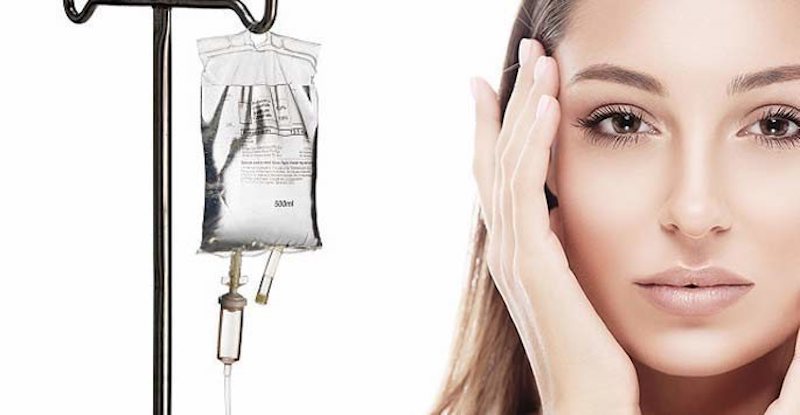The hype surrounding glutathione’s lightening properties has resulted in physicians frequently referring to it and administering it as a wonder drug for fading hyperpigmentation.
But how does glutathione work? And what are some of the glutathione benefits for the skin?
In this article, we will talk about the master brightener, and a somewhat controversial ingredient in some parts of the world, its potential benefits for the skin, as well as how to use it correctly, and what are some side effects you need to watch out for.

What is Glutathione?
Glutathione is an antioxidant naturally found in human cells that neutralizes free radicals, boosts the immune system, and aids in elimination processes to protect the body from damage, disease, and even deterioration.
Glutathione is composed of three amino acids: glutamine, glycine, and cysteine, which all play a role in promoting and maintaining skin health.
While healthy people have enough glutathione in their bodies, factors such as poor nutrition, environmental toxins, and stress can deplete the body’s reserves, potentially impacting immune function.
How Does Glutathione Work?
Glutathione works primarily as an antioxidant, counteracting the damaging effects of free radicals within our bodies.
These free radicals are produced from normal metabolic processes but, when left unchecked, can cause oxidative stress, leading to cellular damage.
Glutathione neutralizes these free radicals, helps in the detoxification process, and aids in the recycling of other antioxidants, thereby maintaining the body’s immune system.
Moreover, it also plays a crucial role in several metabolic and biochemical reactions, such as DNA synthesis and repair, protein synthesis, and enzyme activation.
Finally, glutathione is essential for optimal liver function.
The liver, often referred to as the body’s detoxification hub, uses glutathione to neutralize harmful toxins, chemicals, and pollutants we ingest and breathe, making it essential for liver detoxification.
The glutathione molecule binds to toxins during these processes before they are expelled through bile or urine.
Additionally, in cases of liver disease or impairment, glutathione levels are often seen to be depleted, further emphasizing its role in maintaining liver health.
All these functions show us that every cell in the body can benefit from maintaining optimal glutathione levels and that this antioxidant is essential for overall health and well-being.
The Benefits of Glutathione For The Skin
As an essential component for overall health and well-being, glutathione also plays a vital role in skin health.
Here are several benefits of glutathione for the skin:
Antioxidant: As a potent antioxidant, glutathione protects the skin against environmental damage by neutralizing harmful free radicals. It safeguards the skin from the damaging effects of UV radiation, pollution, and other environmental stressors, thereby preventing premature skin aging.
Melanin Regulation: Glutathione inhibits melanin production, the pigment responsible for skin color. This inhibition can lighten skin and reduce the appearance of dark spots, hyperpigmentation, and other skin blemishes.
Skin Health Promotion: Glutathione promotes skin health by boosting collagen production and aiding in cellular repair and regeneration. This leads to firmer, smoother, and more youthful-looking skin.
Detoxification: By aiding the detoxification process, glutathione helps eliminate toxins from the body, improving skin clarity and brightness.
Inflammation Reduction: Glutathione has anti-inflammatory properties and may help to reduce inflammation in the skin, potentially benefiting conditions such as acne, psoriasis, and eczema.
The Side Effects of Glutathione
Although beneficial for our health and well-being, it is essential to note that excessive glutathione levels can potentially lead to side effects.
Some common side effects of glutathione supplementation may include:
- Allergic Reactions: Some individuals may experience allergic reactions to glutathione, including rashes, hives, or swelling.
- Abdominal Cramps: Oral glutathione intake has been associated with abdominal cramps and bloating in some cases.
- Breathing Difficulty: Inhalation of glutathione may cause difficulty breathing, especially in individuals with asthma or other respiratory conditions.
- Interference with Chemotherapy: There are concerns that antioxidants like glutathione could interfere with the effectiveness of chemotherapy treatments.
- Skin Cancer: Unmonitored and prolonged use of glutathione for skin-lightening purposes can potentially increase the risk of skin cancer.
Additionally, glutathione is aggressively marketed and widely used in Asian countries such as the Philippines and India for skin-lightening purposes.
This trend is driven by societal pressures and beauty standards that often link fair skin with beauty and high social status.
However, this use is not always appropriately monitored, leading to potential health concerns.
Unregulated use can result in the overuse of glutathione, which could lead to harmful side effects, some of which are mentioned above.
Moreover, the skin-lightening effect of glutathione is due to the inhibition of melanin production, a pigment that protects our skin from the harmful effects of sun exposure.
Thus, reducing melanin levels in the skin could potentially increase the risk of skin cancer.
Therefore, it’s crucial to use glutathione, especially in a pill or injectable form, under medical supervision and maintain a balanced and cautious approach towards individual skin goals to avoid potential side effects.
How to Use Glutathione?

Glutathione can be introduced into our bodies in the following ways:
- Supplements: Oral glutathione supplements are also available, but the body may not absorb them well, and their effectiveness can vary.
- Injections: Injectable glutathione is used primarily for its skin-lightening effects and is typically administered by a healthcare provider. While this method ensures complete absorption, it can lead to a higher risk of side effects if not correctly monitored.
- Topical Applications: Glutathione can be applied topically using lotions, creams, or serums. This method is the safest and most direct way to reap the skin benefits of glutathione.
The best way to use glutathione for skin benefits is through topical application.
Unlike other methods, the topical application allows for direct absorption by the skin, providing antioxidant benefits exactly where needed.
Moreover, as it is not absorbed into the bloodstream, the risk of systemic side effects is significantly reduced.
By using glutathione topically, you can harness its antioxidant power directly for your skin health, promoting a brighter, more youthful appearance.
How to Increase Glutathione Levels Naturally?
Boosting glutathione levels naturally not only leans on dietary choices but also on adopting healthier lifestyle habits.
Regular physical activity can stimulate your body to produce more glutathione, as exercise triggers the body’s antioxidant defense system, which helps offset oxidative stress generated during a workout.
During this process, the demand for glutathione significantly increases to combat the elevated oxidative stress.
Furthermore, adequate sleep and stress management are also vital for maintaining optimal glutathione levels, as chronic stress and lack of sleep can deplete glutathione reserves in the body.
Additionally, moderate consumption of alcohol and avoiding exposure to environmental toxins, such as smoking and pollution, can also contribute to maintaining adequate levels of this vital antioxidant.
Finally, when it comes to your diet, consuming glutathione-rich foods can help increase your body’s natural production of this antioxidant.
Here is a list of foods known for their high glutathione content:
- Cruciferous Vegetables: Broccoli, brussels sprouts, cauliflower, and kale are rich in sulfur, which is necessary for producing glutathione.
- Allium Vegetables: Garlic, onions, and leeks also contain high amounts of sulfur.
- Fruits: Avocados, peaches, and melons are known for their high glutathione content.
- Protein-rich Foods: Meats, fish, and poultry contain cysteine, a sulfur-containing amino acid that is a vital component in glutathione production.
- Spices: Turmeric and cinnamon have been shown to boost glutathione levels.
- Nuts and Seeds: Almonds and sunflower seeds are excellent sources of selenium, which is needed to produce glutathione.
- Legumes: Lentils, chickpeas, and other legumes are high in folate, a nutrient crucial for producing glutathione.
Remember, maintaining a balanced and varied diet is vital to ensuring your body gets all the nutrients it needs to produce glutathione effectively.
Frequently Asked Questions
Does Glutathione Help With Acne?
Glutathione combats oxidative stress, which is a significant factor in the development of acne, helping to reduce inflammation and boost skin health.
Can Glutathione Get Rid of Hyperpigmentation?
By curbing the production of melanin, glutathione helps lighten hyperpigmentation and dark patches, resulting in a more even skin tone.
However, it’s important to note that the efficacy and safety of glutathione for this purpose can vary, and it should always be used under professional supervision.
Can You Use Glutathione and Accutane?
Glutathione is an antioxidant that can help reduce the oxidative stress of Accutane on the liver; therefore, combining the two can be beneficial and lower the risk of liver damage.

My name is Simone and I am a certified skin specialist. I created this website to teach my readers how to take great care of their skin and I also like to occasionally share my honest opinions on skincare products I’ve tried. You can learn more about me here.
